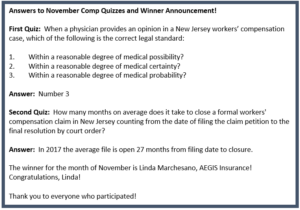Report of Plaintiff’s Personal Doctor Undercuts Her ADA Claim for Discrimination in Post-Offer Exam
On July 26, 2012, Stephanie Nichols applied for a job as a Senior Radiology Technologist with OhioHealth Corp at the Riverside Breast Health Center. She had worked in similar positions for over 30 years. Nichols received the job offer contingent on passing a medical examination. In the health assessment form that Nichols completed, she was asked “Do you have any limitations that would keep you from performing the duties of your job?” Her answer was, “Cannot stoop or work standing on my knees.”
Nichols indicated that her limitations stemmed from a prior meniscus tear that had been repaired one year before she applied for the job. She added that she has poor balance and that if she needs to go down to the floor that she usually “hangs onto something.”
The next step was a meeting with the Riverside Hospital nurse, Charissa Cattrell. In that meeting Nichols clarified that kneeling caused her knee pain. She said she could do the job but that performing some of her duties would cause her more knee pain.
Cattrell referred Nichols to an accommodation specialist, Nancy Miller, at the hospital. Nichols spoke with the accommodation specialist but said that did not ask for accommodations because she felt she did not need any. Miller had a different recollection of the phone call and recalled that Nichols requested accommodations by potentially leaving the door to the mammography suite open or having another person to be available to assist her. Miller said that there was also a discussion about grab bars being installed to help Nichols with any balance issues.
Miller then spoke with the manager of Radiology about the possible accommodations. The manager said that leaving the door open would violate hospital rules, and installation of grab bars was not possible because of the size of the rooms.
Miller next discussed with Nichols the importance of getting a note from her own doctor stating that Nichols had no limitations. Nichols offered to come to the hospital and demonstrate that she could do the job, but that offer was declined. Plaintiff’s physician, Dr. Barker, then faxed a note to OhioHealth stating, “Patient was last seen 9/7/11. The patient was released without restrictions at that appointment.” He faxed a second note stating, “Nichols has not required physical therapy at this point in time but certainly she will give us a phone call if she stalls with progress and perceives the need for some reconditioning, which would be nicely accomplished by therapy if necessary.”
The next day Nichols advised hospital personnel that she was ready for orientation. She was informed that the job offer had been rescinded and the position would not be filled. Plaintiff sued alleging that the hospital discriminated against her based on her disability or her perceived disability in withdrawing the job offer.
The hospital moved to dismiss the case on the ground that Nichols did not have a covered disability under the ADA. In her deposition, Nichols admitted that she is not disabled; she just has pain sometimes. The hospital also argued that Nichols’ own doctor said she has no restrictions whatsoever. “The Court agrees with Plaintiff that Dr. Barker’s return to work without restrictions is not dispositive of whether or not she has a disability, but it is a significant blow to her claim that the knee injury substantially limited a major life activity.” The Court added, “Further, that her doctor released her without restrictions and that she never sought medical help for her knee between the surgery and the events in this lawsuit is evidence that her knee injury did not substantially limit a major life activity.”
Nichols also argued that even if she did not have a disability, the hospital perceived her as having one and therefore regarded her as being disabled in violation of the ADA. The Court also dismissed this argument: “Although this evidence certainly suggests that OhioHealth knew of a possible impairment, the Court agrees with the Defendant that receipt of a doctor’s report showing no restrictions has a preclusive effect on a regarded-as-claim.”
This case illustrates the difficulty a plaintiff may have in proving an ADA claim where, on the one hand, the plaintiff asserts that she can do her job without accommodation and her doctor finds no restrictions, but on the other hand the plaintiff asserts that she has a covered ADA disability. It is difficult to square those two positions, and the court in this case clearly made the right decision to dismiss this case. The case can be found at Nichols v. OhioHealth Corp., 2017 U.S. Dist. LEXIS 131146 (S.D. Ohio August 17, 2017).









Connect with Capehart Scatchard